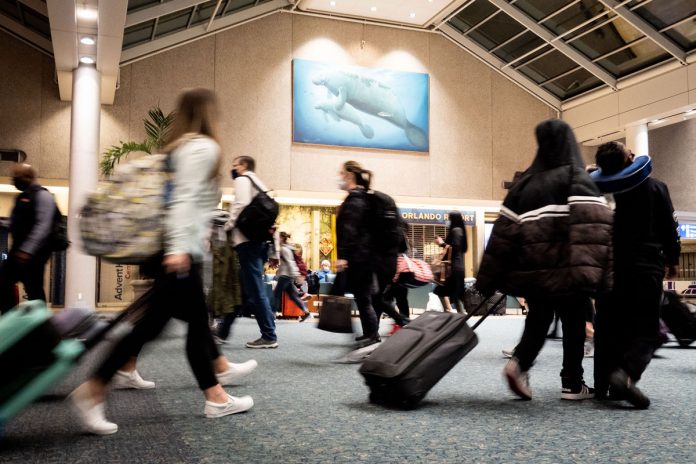
For 12 straight days and counting, Transportation Security Administration officers have screened more than 1 million people a day at domestic airports. On Skyscanner, a travel-booking site, weekly booking volume has increased by 75% in the last month. In a recent survey of nearly 2,800 clients, Travel Leaders Network, a North American consortium of travel advisers, found that those who are vaccinated are 20% more likely than their unvaccinated peers to have a vacation booked.
As national vaccination rates trend upward, more people are traveling or planning to travel. If you hope to do the same this spring, here’s the latest information and guidance.
Q: What is the official stance of the CDC on travel?
A: Earlier this month, in a new set of guidelines for fully vaccinated Americans, the Centers for Disease Control and Prevention left its stance on travel unchanged: Don’t do it unless you must, even if you are fully vaccinated.
On Monday, Dr. Rochelle Walensky, the CDC’s director, warned Americans that traveling could increase the risk of spreading the virus, particularly new variants, and urged against travel.
“We’re worried not just for what happens when you are on the airplane itself, but what happens when people travel,” she said. “We just don’t want to be at this rapid uptick of cases again.”
Q: Why would fully vaccinated people not be encouraged to travel?
A: The issue isn’t so much vaccinated people themselves, who are largely protected against serious disease and death. It’s everyone else: the unvaccinated travelers in the airport security line, by the hotel pool and across the aisle on the train. That’s because one major scientific question is still unsettled: Can a vaccinated person transmit the virus to an unvaccinated one? As my New York Times colleague Apoorva Mandavilli recently wrote, “While all of the COVID-19 vaccines are spectacularly good at shielding people from severe illness and death, the research is unclear on exactly how well they stop the virus from taking root in an immunized person’s nose and then spreading to others.”
Although “most vaccines don’t completely prevent infection,” said Crystal Watson, a senior scholar at the Center for Health Security at the Johns Hopkins Bloomberg School of Public Health, “many do prevent infection from spreading in the body and causing disease, which often also prevents transmission because viral loads are low.”
As for why the CDC seems to be proceeding cautiously: “The issue right now is that we don’t have much data on how well COVID-19 vaccines prevent transmission,” Watson said. “The data we do have so far is encouraging, but there is still uncertainty. It also may differ, depending on the vaccine and presence of variants of concern in circulation.”
Q: With some states eliminating some restrictions, are masks still required on airplanes and in airports?
A: Yes. In January, President Joe Biden mandated masks nationwide for airports and interstate travel, including planes, trains and buses. Which means you’ll still have to wear a mask at Dallas Fort Worth International Airport, even though masks are no longer required in Texas.
Travel executives, meanwhile, have hinted that masks and other mitigation measures may be around for a while.
“We refresh the air in the cabin every two to three minutes,” said Gary Kelly, CEO of Southwest Airlines, in a Washington Post forum earlier this month. “We have very intense deep cleaning protocols. And those things won’t go away just because the pandemic is declared ended. So, I think it just remains to be seen what role masks play in an enclosed environment like that.”
Q: If I do travel, what are some ways I can protect myself and others?
A: A year in, the basics are old hat: Wear a snug mask, avoid crowds (for instance, don’t congregate by the gate while boarding) and wash your hands. The CDC also recommends waiting two weeks after your second vaccine dose before traveling — long enough for protection to kick in — and getting a coronavirus test within three days of departure and upon return.
“Because we have an open scientific question of whether you can transmit even if you’ve been vaccinated, I think that’s a reasonable thing to do,” Watson said. “Let’s take those extra steps to protect each other — and then we can get this under control more quickly.”
Q: How do I decide where to go?
A: Some spring and summer stalwarts are nonstarters; most of Europe, for example, for now remains off-limits to most Americans. Health experts also recommend common-sense precautions, like avoiding international travel to countries with high infection rates and inadequate medical infrastructure.
“You want to make sure you don’t bring the virus back with you, and you also don’t want to burden another health care system if, in the very low chance, you do become sick and become symptomatic,” Watson said.
When traveling domestically, research infection and vaccination rates in the destination. And pick places and trips that naturally encourage being outside and remaining socially distanced from strangers.
“We should try to try to hold the line and do the things we know are safe, because we still have so much virus out there,” Watson said. “Regardless of vaccination status, I would not go into a crowded club right now.”
Q: Do I need to show proof of vaccination in order to travel?
A: Broadly speaking: not yet. But probably eventually, depending on where you’re going.
Although proof of vaccination is not yet required to board a plane or book a hotel, it’s starting to open certain doors.
As of Friday, Americans who are fully vaccinated (or those who can prove previous infection) can travel to Iceland, and vaccinated (or previously infected) European Union and European Economic Area citizens are allowed to avoid Iceland’s existing border measures like testing and quarantine. Vaccinated foreigners can also sidestep testing and quarantining in Belize. Other countries are almost certain to follow suit in the coming months.
As a means to reboot the decimated tourism industry, the European Union is considering a proposal to adopt a digital pass that would allow fully vaccinated EU residents and their families (or those who can produce a negative test or recovery from the virus) to travel freely within the bloc.
In the meantime, the airline industry is testing various vaccine passports, which digitally store vaccination records, test results and other health information. Passengers on British Airways flights from London to India can now input their health information while booking, just as they would a passport number. Third-party health apps, including CommonPass and the IATA Travel Pass, are being tested on different airlines and routes, and are expected to be rolled out to the public in the coming months. Earlier this month, Air France launched a trial program of an app called the ICC AOKpass on round-trip flights between Paris and Los Angeles and Paris and San Francisco.
In an interview last week on NBC Nightly News, Ed Bastian, CEO of Delta Air Lines, said it’s likely that vaccine passports will eventually be required for international flights.
Proof of vaccination may also be required to board a cruise ship: Royal Caribbean is requiring passengers 16 and older to be vaccinated for the May maiden voyage of Odyssey of the Seas, which will depart from Israel — which is outpacing much of the world in vaccinations — and sail the Mediterranean. Virgin Voyages, Crystal Cruises and other cruise lines have also announced vaccine requirements for all passengers and crew.
The idea of proof of vaccination as a requirement for travel is not new; certain countries require travelers to be vaccinated against yellow fever. The World Health Organization, for its part, has come out against the idea of COVID-19 vaccine certificates to greenlight travel.
“Quite simply, vaccination is just not available enough around the world and is not available certainly on an equitable basis,” said Michael Ryan, executive director of the WHO Health Emergencies Program, during a news conference earlier this month.
Q: What should I expect at my hotel or Airbnb?
A: In short: fewer people, lots of cleaning and, most likely, scaled-back amenities.
The hotel industry got clobbered last year; the latest forecast from the American Hotel & Lodging Association projects that half of domestic hotel rooms will remain empty this year, with sector employment hovering around 500,000 jobs lower than pre-pandemic levels.
The report also found that 62% of consumers consider cleanliness among the top factors when choosing a hotel. Last year, all the major chains and most of the independents introduced sweeping new health-and-safety guidelines, which are still in place today even as business ticks up: enhanced cleaning and disinfection, social distancing, mask mandates and, depending on state and local restrictions, occupancy limits and pared-back services like dining, spas and babysitting. Many hotel companies, including Marriott, Hilton, Hyatt and IHG, also offer contactless digital check-in and checkout; some have also introduced physical door “seals” — an indication that no one has entered a room since it was last cleaned.
Vacation rental companies have also revised their standards. Airbnb guests and hosts are required to wear masks when interacting in person, and hosts are required to complete a five-step cleaning process — which includes detailed guidelines for how approved disinfectants must be used — between stays.
Q: If I’m traveling between states, will I still have to quarantine or take a test?
A: It depends. In the last month or two, several states — including Maine, New Hampshire, Oregon, Ohio and New York — have loosened testing and quarantine requirements for fully vaccinated visitors and returning residents. Expect cross-state guidelines to continue to evolve as more becomes known about vaccine efficacy.
The good news: “The data that we have so far is encouraging — we’re seeing in some of the trials that there does appear to be a large reduction in transmission and, in some cases, even infection,” Watson said.
Copyright 2021 The New York Times Company














